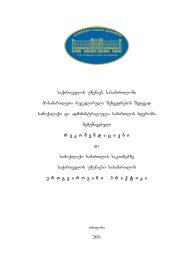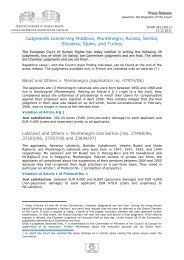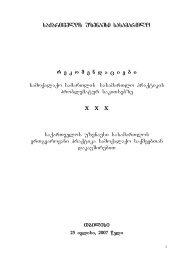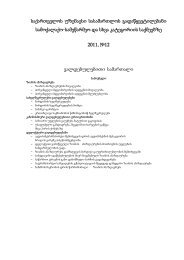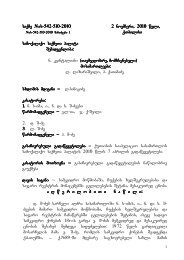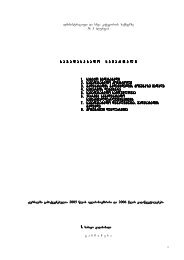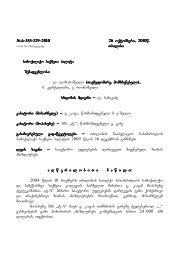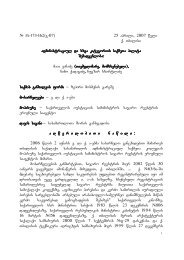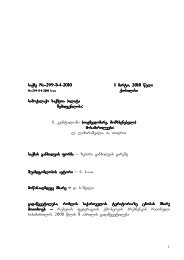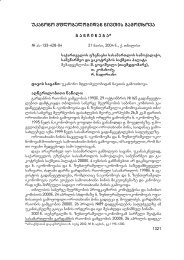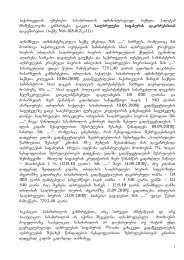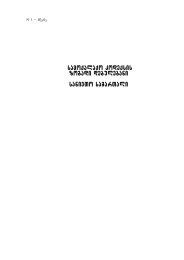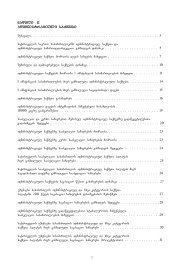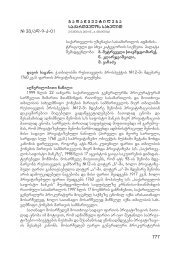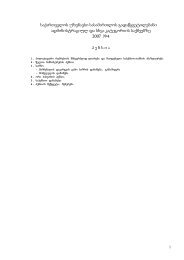doqtorantTa forumiThe second category entails cases concentration camp, where the perpetrators are mostly or administrativepersonal. According to the Yugoslavia Tribunal, the perpetrator must be aware of the criminal character ofthe system and act with intent to further it.The third category, named extended form, concerns the attribution of criminal responsibility for crimescommitted by other participants exceeding the framework of the common plan.According to abovementioned under first two categories the participants are responsible for crimescommitted within the framework of the common plan; the third category of joint criminal enterprise goesbeyond the framework of the common plan. While the actus reus can be the same for each of the threecategories, they differ in respect of the mens rea.Commission is characterized with two elements: “committing” and “jointly with another”. It entails bothan objective and a subjective element. Objective element means the contribution to the physical commissionof the crime, subjective element - an agreement between the co-perpetrators. 14 While the definition of abovementioned elements will be clearly established, its interpreting is different in various national legal orders.According to Article 25 (c) of ICC Statute joint commission requires the highest level of individualcriminal responsibility. For joint commission the existence of actus reus and mens rea are necessary. Actusreus and mens rea provides some interpretations of different elements of commission, that are different fromthe case law of ad hoc Tribunals.Actus reus of joint commission means the existence of a group of person, common plan and the contributionof the accused within the common plan. As for mens rea, all persons committing crime, should act with theexistence of mental element. In comparison with the concept of joint commission defined by ICTY case lawabovementioned concept is more specific in relation with actus reus and mens rea.If the perpetrator uses another person as an instrument to commit a crime under international law, this isa basis for criminal responsibility under Article 25(3)(a) of the ICC Statute. This type of commission isrecognized by the major legal systems in the world. However, before the ICC Statute entered into force, theresponsibility for perpetrator -by-means had not been regulated neither by international criminal law nor byinternational courts.Criminal responsibility under Article 25(3)(a) is independent regardless of whether that other person iscriminally responsible. Under the norm a perpetrator-by-means can be liable if the direct perpetrator is notresponsible, for example, if he or she is not yet of legal age. This norm implies the concept of the “perpetratorbehind the perpetrator”, what means that the direct perpetrator can be manipulate.. This doctrine wasrecently used by the German Supreme Court in the cases of the killings at the inner-German border between1961 and 1989.ICC Statute doesn‚t regulate the commission of crime by omission. ICC Statute drafts included suchnorm, but finally it didn‚t become part of the ICC Statute, as some states, especially France, expressedserious reservations about establishing general liability for omissions.However, there is no doubt that in certain circumstances, a simple omission can cause a crime underinternational criminal law. One example relates to command responsibility under Article 28; the basis forcriminal liability in this case is the failure to prevent or to report a crime under international law.Case Law of the ad hoc Tribunals (both the Yugoslavia and the Rwanda Tribunals) determined thatliability can arise from omission. In treaty law, Article 86 of Additional Protocol I provides that breaches ofthe Geneva Conventions can result “from failure to act when under a duty to do so” as well as from acting 15 .Furthermore, some of the Nuremberg follow-up trials also recognized criminal responsibility for omission.Finally, liability for omission can be qualified as a general principle of law, as comparative analysis showsthat with the exception of French law, almost all legal cultures establish such liability. 1614Judgment, Tadic (IT-94-1-A), Appeals Chamber, 15 July 1999, paragraph 227.15Werle G., Individual Criminal Responsibility in Article 25 ICC Statute, “Journal of International CriminalJustice”, 2007, p. 958.16Additional Protocol I of Geneva Conventions, article 86.102
marTlmsajuleba, 2008, #34. Instigation and OrderingAnyone who orders the commission of a crime under international law or who instigates another tocommit such a crime is criminally liable under Article 25(3)(b) of the ICC Statute.According to the case law of ad hoc Tribunals, an instigator is someone who prompts another to commita crime under international law. 17 Abovementioned can also be achieved by omission. 18 The existence ofcasual link between the instigation and the commission of the crime is an important matter. It means that theinstigation has contributed to the conduct of the person committing the crime.The question about the sharing special intent in relations with instigation is very interesting. Ad hocTribunals have not clear position about the issue. According to International Criminal Court the instigatormust be acquainted with the perpetrator‚s special intent, but need not share it. Under this approach, lesserdegree of responsibility is provided for instigation than perpetration, since it is not necessary that theinstigator fulfill the mens rea of the crime.Ordering requires the existence of subordinate-relations between person giving and person receivingthe order. Person who gives the order is using his/her authority to cause another person to commit thecrime. In case of ordering there is intent for the crime to be committed, and the person who orders to commitcrime acknowledges the criminal result.5. AssistanceAnyone who aids in the commission of a crime under international law is criminally liable under Article25(3)(c) of the ICC Statute. The responsibility for the assistance is also determined by the case law of ad hocTribunals. According to case law of ad hoc Tribunals assistance should have a significant effect on thecommitment of crime.As for the ICC Article 25(3)(c) does not require that the assistance has a substantial effect on thecommission of the crime.The level of personal involvement in the criminal events and the degree of individual criminalresponsibility is determined by the mode of participation. Assistance covers acts that were not essential incausing the criminal result. Thus assistance is one of the modes of participation and it‚s provided rather lowdegree of individual criminal responsibility than commission of crime or instigating and ordering.6. Contribution to a Group CrimeArticle 25(3)(d) of the ICC Statute regulates one of the modes of criminal participation: contributing tothe commission of a crime by a group. Group means the association of at least three persons acting for thesame purpose.The wording covers any contribution to the group crime. This provision applies to indirect forms ofassistance (for example, financing the group), that do not warrant liability for either co-perpetration oraiding and abetting, as they have no substantial effect on the commission of the crime under internationallaw.17Duttwiler M., Liability for Omission in International Criminal Law, “International Criminal Law Review”, 2006,p.30.18Judgment, Kordic and Cerkez (IT-95-14/2-A), Appeals Chamber, 17 December 2004, paragraph 27.19v Judgment, Blaskic (IT-95-14-T), Trial Chamber, 3 March 2000, paragraphs 280, 339.103
- Page 1 and 2:
marTlmsajuleba, 2008, #3saqarTvelos
- Page 3 and 4:
marTlmsajuleba, 2008, #3s a r C e v
- Page 5 and 6:
marTlmsajuleba, 2008, #3TanagrZnobi
- Page 7 and 8:
marTlmsajuleba, 2008, #3sasamarTlo
- Page 9 and 10:
marTlmsajuleba, 2008, #3_ sxva prog
- Page 11 and 12:
marTlmsajuleba, 2008, #3sasamarTlos
- Page 13 and 14:
marTlmsajuleba, 2008, #3saqarTvelos
- Page 15 and 16:
marTlmsajuleba, 2008, #3sazogadoebr
- Page 17 and 18:
marTlmsajuleba, 2008, #3venis konve
- Page 19 and 20:
marTlmsajuleba, 2008, #3konvenciis
- Page 21 and 22:
marTlmsajuleba, 2008, #3venis nasyi
- Page 23 and 24:
marTlmsajuleba, 2008, #3zaza nadara
- Page 25 and 26:
marTlmsajuleba, 2008, #3sastiki moq
- Page 27 and 28:
marTlmsajuleba, 2008, #3Sesaxeb rf-
- Page 29 and 30:
marTlmsajuleba, 2008, #3saxelmwifo
- Page 31 and 32:
marTlmsajuleba, 2008, #3eklesia da
- Page 33 and 34:
marTlmsajuleba, 2008, #3mosaxleobis
- Page 35 and 36:
marTlmsajuleba, 2008, #3dros pirs s
- Page 37 and 38:
marTlmsajuleba, 2008, #3rom gulgril
- Page 39 and 40:
marTlmsajuleba, 2008, #3ganzraxvis
- Page 41 and 42:
marTlmsajuleba, 2008, #3giorgi lanC
- Page 43 and 44:
marTlmsajuleba, 2008, #3„danaSaul
- Page 45 and 46:
marTlmsajuleba, 2008, #3sxvadasxva,
- Page 47 and 48:
marTlmsajuleba, 2008, #3aRniSnuli d
- Page 49 and 50:
marTlmsajuleba, 2008, #3katebisa da
- Page 51 and 52: marTlmsajuleba, 2008, #3rom erTi da
- Page 53 and 54: marTlmsajuleba, 2008, #3sanam kompi
- Page 55 and 56: marTlmsajuleba, 2008, #3axla ganvix
- Page 57 and 58: marTlmsajuleba, 2008, #3cnobilia, r
- Page 59 and 60: marTlmsajuleba, 2008, #3saSualebas
- Page 61 and 62: marTlmsajuleba, 2008, #3gadaxdis sa
- Page 63 and 64: marTlmsajuleba, 2008, #3am uflebis
- Page 65 and 66: marTlmsajuleba, 2008, #3Taobaze. Cv
- Page 67 and 68: marTlmsajuleba, 2008, #3gamoyenebiT
- Page 69 and 70: marTlmsajuleba, 2008, #3ar ekrZaleb
- Page 71 and 72: marTlmsajuleba, 2008, #3programis m
- Page 73 and 74: marTlmsajuleba, 2008, #3daskvnasaqa
- Page 75 and 76: marTlmsajuleba, 2008, #3nana naWyeb
- Page 77 and 78: marTlmsajuleba, 2008, #3i. funkic T
- Page 79 and 80: marTlmsajuleba, 2008, #3qorwinebis
- Page 81 and 82: marTlmsajuleba, 2008, #3nivTebze me
- Page 83 and 84: marTlmsajuleba, 2008, #3winamdebare
- Page 85 and 86: marTlmsajuleba, 2008, #3According t
- Page 87 and 88: marTlmsajuleba, 2008, #3Persons in
- Page 89 and 90: marTlmsajuleba, 2008, #3As recommen
- Page 91 and 92: marTlmsajuleba, 2008, #3distanciura
- Page 93 and 94: marTlmsajuleba, 2008, #31. pasuxism
- Page 95 and 96: marTlmsajuleba, 2008, #3mens rea-s,
- Page 97 and 98: marTlmsajuleba, 2008, #3warmoadgens
- Page 99 and 100: marTlmsajuleba, 2008, #3MARIAM JIKI
- Page 101: marTlmsajuleba, 2008, #3The signifi
- Page 105 and 106: marTlmsajuleba, 2008, #3mixeil gabu
- Page 107 and 108: marTlmsajuleba, 2008, #3bunebrivi,
- Page 109 and 110: marTlmsajuleba, 2008, #3mizanSewoni
- Page 111 and 112: marTlmsajuleba, 2008, #3processac.
- Page 113 and 114: marTlmsajuleba, 2008, #3politikis h
- Page 115: marTlmsajuleba, 2008, #3kiberdamnaS



